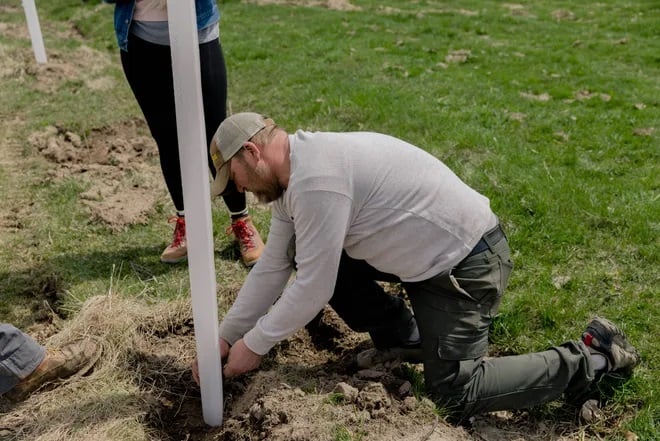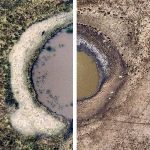
The foot of rain that fell in mere hours over western Wisconsin one night in August 2018 destroyed part of Tucker Gretebeck’s farmland.
Floodwaters overtopped a nearby dam and poured into the valley on his property near Cashton. It ripped up trees that provided shade for his grass-fed dairy herd, whose milk gets sold by the La Farge-based organic farmer cooperative Organic Valley.
Afterward, he needed a solution to keep his cows cool, so they could stay relaxed and provide milk. At the same time, Organic Valley leadership was brainstorming ways to further the co-op’s sustainability efforts.
Today, Gretebeck is getting paid for the carbon that will be stored by more than 1,000 black walnut and honey locust trees on his farm, which he and others planted in 2022. He’s one of a small group of farmers participating in the initial round of Organic Valley’s carbon insetting program.
“We just put little whips in the ground (in 2022), and everybody understands they’re not going to collect a whole lot of carbon right now,” Gretebeck said. “But in 15 years when these things are rolling, it’s going to be beautiful.”
Many people have become familiar with carbon offsetting, in which companies invest in projects that lower the amount of carbon dioxide emitted into the atmosphere to balance out their own carbon use and thus meet industry goals to become carbon-neutral. But as its popularity grows, critics say the practice does nothing to encourage those companies to reduce their own emissions and instead puts the onus on another entity.
Carbon “insetting” happens when a company reduces emissions in its own supply chain, not someone else’s. For Organic Valley, that means trying to reduce the carbon footprint of its dairies.
Cows have a considerable impact on climate change, mostly by way of methane production, which happens as part of the animals’ natural digestive process, as well as in the manure storage process. It’s estimated that cattle and sheep production systems account for up to 18% of global greenhouse gas emissions.
In late January, Organic Valley announced payments had been made to a few of its farmers who will undertake projects to curb some of those climate impacts. The projects will include better manure management, different feed to reduce emissions from cow burps, solar energy and, in Gretebeck’s case, trees that will hold carbon. Livestock pastures with trees have been shown to hold more carbon than open pasture lands.

The process to make sure the projects really are reducing carbon will be largely the same as it is for offsetting programs. Organic Valley will collect annual data to be able to make a verified carbon claim that results in a payment to the farmer, said Nicole Rakobitsch, the co-op’s director of sustainability. The initial agreements are on a five-year renewable timeline, Rakobitsch said, and farmers will get paid for each year that they keep the project installed and maintained.
But insetting “is exactly the answer,” she said, to the concern that offsetting has become a way for companies to keep their emissions at status quo while marketing themselves as environmentally friendly.
Sara Place, an associate professor in the department of animal sciences at AgNext at Colorado State University, said carbon offsets exist because some industries are hard to decarbonize. But for industries that can reduce their own emissions, she said, pursuing insetting makes a lot of sense.
Especially given the tough economics of farming today, Place said, it’s beneficial for companies to compensate the farmers and ranchers who are helping their company reduce emissions, especially to meet industry standards. (The dairy industry, for example, is aiming to be carbon-neutral by 2050.)
“I think it’s a smart way to go about it,” she said. “You’re paying for what you want.”
As the concept of insetting evolves, Place said, scientists will need to develop sound ways of tracking the effects of these projects to ensure that companies can feel confident they’re getting the outcome they expected.

Organic Valley hopes to bring 500 farms into its carbon insetting program over the next five years, Rakobitsch said. But it will start small, using money from a U.S. Department of Agriculture Climate Smart Commodities grant to help farmers plan out and install the projects they want to pursue. The direct payments to farmers for carbon storage wouldn’t be able to cover that technical assistance, she said.
The limitations of those payments is one reason why the projects need to have additional benefits that help farmers solve problems, Rakobitsch said. Switching to solar energy, for example, can lower energy bills, and composting manure means less manure to haul. These benefits will be essential to convincing more farmers to adopt climate friendly practices, she said.
For Gretebeck, the trees now growing on his pasture will one day provide shade to keep his cows comfortable and ready to be milked.
“If they can get one more hour of eating (in the pasture) on those hot days, it’s going to go right into the tank,” he said, “which means new shoes for the kids.”
Madeline Heim is a Report for America corps reporter who writes about environmental issues in the Mississippi River watershed and across Wisconsin. Contact her at 920-996-7266 or mheim@gannett.com.























